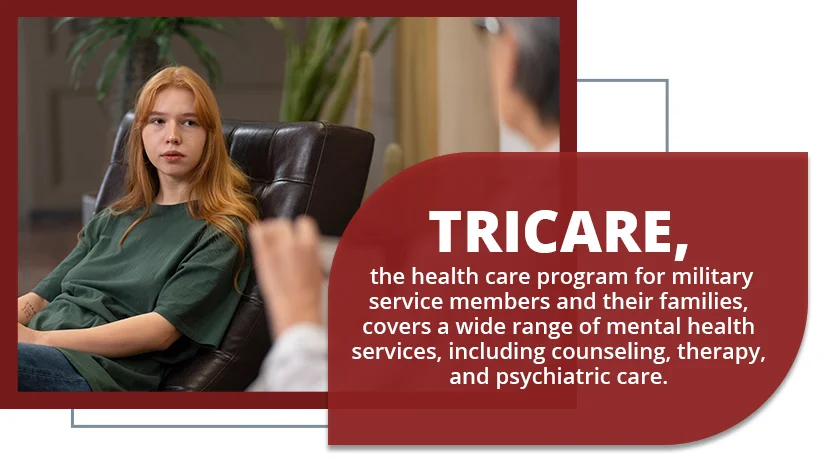
Does TRICARE Cover Mental Health Therapy
TRICARE is a healthcare program that serves active duty service members, National Guard and Reserve members, retirees, and their families. This program provides coverage for mental health therapy as part of its comprehensive benefits, ensuring beneficiaries receive necessary care.
Beneficiaries can access therapy through TRICARE-approved providers in military treatment facilities and civilian networks. Delve into the article to understand how TRICARE supports mental health through its comprehensive coverage of therapy services.
Key Takeaways
TRICARE, essential for military families, covers numerous mental health services. Here’s what this article covers:
- Outpatient services under TRICARE offer flexible options, while inpatient services cater to severe cases with residential programs.
- TRICARE costs vary based on the type of care and the beneficiary’s status, with copayments for services like primary care visits.
- Certain services, such as cosmetic procedures and experimental treatments, may not be covered under TRICARE.
Ready to prioritize your mental health? Call Indiana Center for Recovery today at (844) 650-0064 for information on personalized mental health treatment options and begin your journey toward wellness.

TRICARE Program: An Overview
Mental health care is essential for military families due to their unique challenges. Military life often involves frequent relocations, long deployments, and the risk of injury or loss, which can create significant stress, anxiety, and other mental health issues.
TRICARE, the health care program for military service members and their families, covers a wide range of mental health services, including counseling, therapy, and psychiatric care. Access to these services ensures that military families can get the help they need without financial strain.
TRICARE covers treatment for both inpatient and outpatient care, ensuring that individuals receive suitable care based on their needs. It ensures that military personnel can focus on their duties, knowing their family members receive the support they need.
Types Of Mental Health Services Covered
TRICARE offers different mental health services to support military personnel and their families. Here are the details:
Outpatient Services
Outpatient therapy under TRICARE provides quality mental health care without the need for hospitalization. Here, we explore some outpatient services:
Individual Therapy: Individual therapy contains one-on-one sessions with a licensed therapist to address personal mental illnesses, develop coping strategies, and work through issues such as anxiety or depression.
Group Therapy: Group therapy sessions involve multiple participants and are facilitated by a therapist or a mental health counselor. They allow people to share experiences and support each other in a structured setting.
Family Counseling: Family therapy sessions that involve family members to address relational dynamics, improve communication, and provide emotional support for collective issues affecting the family unit.
Outpatient services provide a flexible option for those seeking help without significant disruption to their lives.
Inpatient Services
Inpatient services are available for individuals requiring intensive mental health care that cannot be managed through outpatient treatment alone. These are the details:
Hospitalization For Severe Cases: Short-term military hospital stays for acute mental health concerns that require immediate and intensive care, including stabilization and a comprehensive treatment plan.
Residential Treatment Programs: Long-term care in a structured residential setting for individuals needing continuous support and treatment for severe mental health conditions, such as severe depression or substance use disorders (SUD).
Inpatient services are critical for people in crisis or those needing a higher level of care to ensure safety and effective mental health treatment.
Emergency Services
Emergency mental health services under TRICARE health plans are designed to provide immediate care for patients experiencing acute mental health crises.
Crisis Intervention is immediate support and intervention for individuals in acute emotional distress aimed at stabilizing the situation and preventing harm.
Emergency Psychiatric Care: Rapid access to psychiatric evaluation and treatment during a mental health emergency, ensuring timely and appropriate care.
Medical emergency services are vital for providing quick and effective responses to mental health challenges and ensuring the safety and well-being of persons in urgent need.
Accessing Mental Health Services Through TRICARE
Accessing mental health services through TRICARE is vital for service members, veterans, and their families seeking support for mental well-being.
Finding Providers
Finding the right mental health care providers is important when accessing health services through TRICARE. These are two primary options for mental health care:
Military Treatment Facilities (MTFs): These facilities offer services to TRICARE members, such as active duty members, retirees, and their families. They provide care from military healthcare professionals who understand the unique challenges military personnel and their families face.
To locate specific MTFs, visit the TRICARE website, contact your local military base, or use the TRICARE Find a Doctor tool online.
Civilian Providers In The TRICARE Network: TRICARE treatment covers services provided by civilian mental health professionals participating in the TRICARE network. This option offers flexibility and accessibility for beneficiaries who prefer or require care outside MTFs.
Whether opting for an MTF or a civilian provider, TRICARE aims to facilitate access to comprehensive mental health services for its eligible members.
Referral And Authorization Requirements
Understanding referral and authorization requirements is important when accessing mental health services through TRICARE.
When Referrals Are Needed: Depending on your TRICARE plan, referrals may be required to see certain specialists or receive specific mental health care. Referrals are typically coordinated by your primary care manager (PCM) or another provider.
How To Obtain Authorizations: Authorization may be required for certain mental health services, particularly outpatient and inpatient care beyond routine visits. Your TRICARE-authorized provider or PCM can assist in obtaining authorizations to ensure coverage.
Navigating the referral and authorization process ensures that beneficiaries receive timely and necessary mental health care under TRICARE insurance coverage.
TRICARE Costs And Coverage Details
Navigating TRICARE coverage and cost details is vital for understanding your healthcare benefits as a military service member, retiree, or family member. Here are the details:
Breakdown Of Costs For Different Types Of Care
Understanding the financial aspects of healthcare services under TRICARE is important for effective planning. Here’s a breakdown of the estimated costs:
Primary Care Visits: The copayment for a primary care visit can generally range from $10 to $30.
Emergency Room Visits: Copayments can range from $50 to $150, depending on the type of health insurance plan.
Inpatient Hospital Stays: Deductibles and copayments can vary significantly. Some plans may have a flat fee per stay (e.g., $200-$500), while others might charge a daily copayment (e.g., $50-$150).
Knowing the specific costs associated with primary care visits can help you make informed decisions about your healthcare options and budget accordingly.
Differences Between Active Duty, Retirees, And Family Members
Understanding how TRICARE benefits vary among active duty service members, retirees, and their families is essential.
Active Duty Service Members: Generally, active duty service members do not pay for medical care, as it is covered under TRICARE Prime.
Retirees: Retirees under age 65 often pay higher copayments and deductibles than active duty members, depending on their TRICARE plan (e.g., TRICARE Prime, TRICARE Select).
Family Members: Family members’ costs vary based on the sponsor’s status (active duty or retired) and the type of TRICARE plan. They typically have lower copayments under TRICARE Prime but higher under TRICARE Select.
Understanding these distinctions ensures each group receives appropriate healthcare coverage under TRICARE.
Coverage Limits And Exclusions
Understanding your insurance coverage’s limitations and omissions is essential for effectively managing healthcare costs.
Maximum number of covered sessions: Insurance plans often limit the number of therapy or physical therapy sessions covered annually, typically ranging from 20 to 30. Additional sessions may require proof of medical necessity for approval.
Services that may not be covered: Certain services, like cosmetic procedures, experimental treatments, and some alternative therapies, are generally excluded. Non-emergency mental health and long-term care may also have limited or no coverage.
Knowing these coverage limits allows you to navigate your healthcare options better and avoid unexpected out-of-pocket costs.
Frequently Asked Questions (FAQ)
Is mental health covered under TRICARE?
TRICARE provides coverage for mental health services for active duty service members, retirees, and their dependents. Coverage includes outpatient therapy, inpatient psychiatric care, medication management, and other mental health treatments deemed medically necessary.
TRICARE covers conditions such as depression, anxiety, PTSD, and substance use disorders. Beneficiaries may receive care through TRICARE’s network of providers, including psychiatrists, psychologists, and licensed counselors. Coverage specifics can vary based on the beneficiary’s plan (Prime, Select, etc.).
Does TRICARE require a referral for a psychiatrist?
TRICARE typically requires a referral for non-active duty beneficiaries to see a psychiatrist. Active duty service members can often see a psychiatrist without a referral. You can schedule an appointment with a network psychiatrist in your region without pre-authorization for outpatient visits, except for psychoanalysis and outpatient therapy for substance use disorder.
To avoid additional costs or coverage issues, it’s important to ensure the provider is within the TRICARE network in your nearby locations.
TRICARE-Covered Mental Health Treatment at Indiana Center For Recovery
At Indiana Center for Recovery TRICARE can cover mental health therapy for active duty service members, retirees, and their families, providing access to comprehensive treatment for depression, anxiety, PTSD, and substance use disorders. Our comprehensive mental health treatment programs provide TRICARE-covered services including intensive inpatient psychiatric services for crisis situations and flexible outpatient mental health treatment options that allow you to receive therapy and medication management while maintaining your responsibilities. Our specialized veterans program addresses the unique challenges faced by military personnel, including trauma, PTSD, and the transition from military to civilian life. Licensed therapists and psychiatrists provide evidence-based therapies tailored to your unique needs, helping you develop coping strategies and build resilience for lasting wellness. Since mental health conditions often co-occur with substance use disorders in military personnel, integrated dual diagnosis treatment addresses both conditions simultaneously.
Our mental health treatment centers across Indiana provide TRICARE-covered mental health treatment programs with licensed professionals who offer evidence-based care designed to help you access the mental health services you need. Call us right now at (844) 650-0064 to verify your TRICARE coverage and learn how we can help you access mental health treatment.


 100% Confidential
100% Confidential
